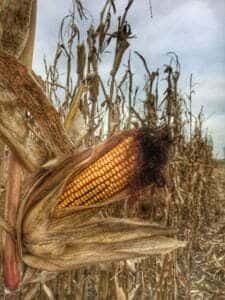Published: October 7, 2019
As combines pop up in fields across the Midwest, the Nebraska Corn Board and Nebraska Corn Growers Association encourage farmers, as well as local residents and visitors, to take a second for safety in rural areas this harvest season.
According to the Centers for Disease Control and Prevention, the agricultural sector is one of the most dangerous industries in America. Over 2 million workers are employed full-time in production agriculture, which does not account for part-time help or family members who also live and work on farms. In 2016, there were 417 reported fatalities of agricultural workers, which equates to 21.4 deaths per 100,000 workers. While harvest season is an opportune time to be mindful of safety precautions, safety should be implemented year-round in the agricultural industry.
“There are lot of moving parts in agriculture, and people need to be responsible,” said David Bruntz, chairman of the Nebraska Corn Board and farmer from Friend. “A lot of accidents can be prevented by just allowing a little extra time and care. We like to tell people to ‘take a second for safety.’ It’s a great reminder for all of us not to get in a hurry and be mindful of our surroundings.”
With factors like fluctuating weather, field conditions and machinery availability, farmers typically have a narrow window to complete their harvest work. Therefore, it’s important farmers take care of themselves to ensure a safe and productive season.
“Farmers need to remember to look out for their own well-being during harvest,” said Dan Nerud, president of the Nebraska Corn Growers Association and farmer from Dorchester. “So often, farmers want to move fast in order to take advantage of good weather, but a tired farmer puts him or herself in danger. It’s important for farmers to get enough rest and take short breaks, when needed. A well-rested farmer is a safe and alert farmer.”
Farmers are not the only people who should be cautious during the harvest season. Anyone who may be visiting or traveling through rural areas should be mindful of increased farm traffic on roads and highways. Harvest equipment should be visible with front and rear warning lights, as well as slow moving vehicle emblems to notify motorists of approaching machinery. In rural areas, parents of small children should also develop safety rules to prevent youth from playing on or near harvest equipment.
Additional tips for farmers, farm workers and rural residents to consider while on the farm this fall (adapted from the National Corn Growers Association):
- Be careful when approaching harvest equipment. Approach from the front and gain eye contact with the operator before approaching.
- Ensure the harvesting equipment is fully stopped and disengaged before climbing onto a vehicle.
- Do not place yourself near any unguarded or otherwise running machinery.
- Avoid pinch points between equipment – such as tractors with grain wagons. Visibility can be limited and serious injury can occur.
Entanglement Hazard
- Entanglement hazards can happen very quickly.
- Do not ever try to unplug any equipment without disengaging power and removing energy from the equipment.
- Never pull or try to remove plugged plants from an operating machine.
- Always keep shields in place to avoid snags and entanglement when working around equipment.
Fall Hazard
- Be careful climbing on and off equipment.
- Be alert and extremely careful when working in wet or slippery conditions.
- Keep all walkways and platforms open and free of tools, dust, debris or other obstacles. Clean all walkways and platforms before use.
- Wear clothing that is well fitting and not baggy or loose. Also wear proper non-slip, closed toe shoes.
- Use grab bars when mounting or dismounting machinery. Face machinery when dismounting and never jump from equipment.
- Never dismount from a moving vehicle.
Fire Prevention
- Carry a fire extinguisher with you in your vehicle (A-B-C, 5 or 10 pound).
- Remove dust and buildup from equipment. Check bearings regularly to prevent overheating and chance of fire.
Grain Wagon Safety
- Be careful to monitor grain wagon weight to never exceed maximum weight limits. As weight increases, grain wagons can be more difficult to control.
- Load grain wagons evenly to distribute weight to prevent weaving or instability across the grain wagon.
- Inspect grain wagon tires and replace any worn or cracked tires.
Grain Bin Safety
- If entering a bin, wear a harness attached to a secure rope.
- Never work alone.
- Never allow children to get too close or inside the bin.
- Wear a dust filter or respirator when working in bins.
- Stay out of bins when equipment is running.
“This may be a unique year where harvest occurs over many weeks,” said Bruntz. “All farmers are excited to see the fruits of their labor, but we all need to be safe in the process.”



